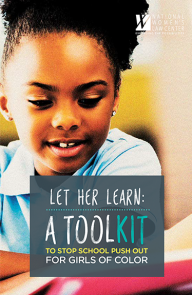Abortion rights, women of color, and LGBTQI+ people are under attack. Pledge to join us in fighting for gender justice.
Here’s How You Can Let Her Learn

 Hope is hard to come by these days. The last few years have brought us too many stories of girls of color, and particularly Black girls, pushed out of school by discriminatory discipline practices. One Florida school banned girls from wearing African head wraps. A Black girl in Georgia accused of writing graffiti was suspended and spent months on probation after her school referred her to law enforcement; her white peer who broke the same rule got off the hook because her parents could pay restitution. According to the Department of Education, Black girls are 5.5 times more likely to be suspended than white girls.
Hope is hard to come by these days. The last few years have brought us too many stories of girls of color, and particularly Black girls, pushed out of school by discriminatory discipline practices. One Florida school banned girls from wearing African head wraps. A Black girl in Georgia accused of writing graffiti was suspended and spent months on probation after her school referred her to law enforcement; her white peer who broke the same rule got off the hook because her parents could pay restitution. According to the Department of Education, Black girls are 5.5 times more likely to be suspended than white girls.
Often, overly punitive, discriminatory policies are coupled with counter-productive and dangerous police enforcement of school rules. In South Carolina, a Black 16-year-old was thrown to the ground by a school police officer for using her phone in class. A police officer stationed in a San Antonio public school body slammed a 12-year-old Latina girl.
The good news is federal law prohibits sex and race discrimination in school discipline. Black, Latina, and American Indian girls and allies who care that schools treat young people fairly can use these laws as a tool to organize for better policies that keep students in the classroom. That’s why we’ve created “Let Her Learn,” a toolkit to learn about your rights, analyze your school’s policies, and plan your campaign to make sure girls of color are treated fairly.
If, after reading through the toolkit, you think you need legal assistance or would like to share your story with us, reach out. We’re here to help.





